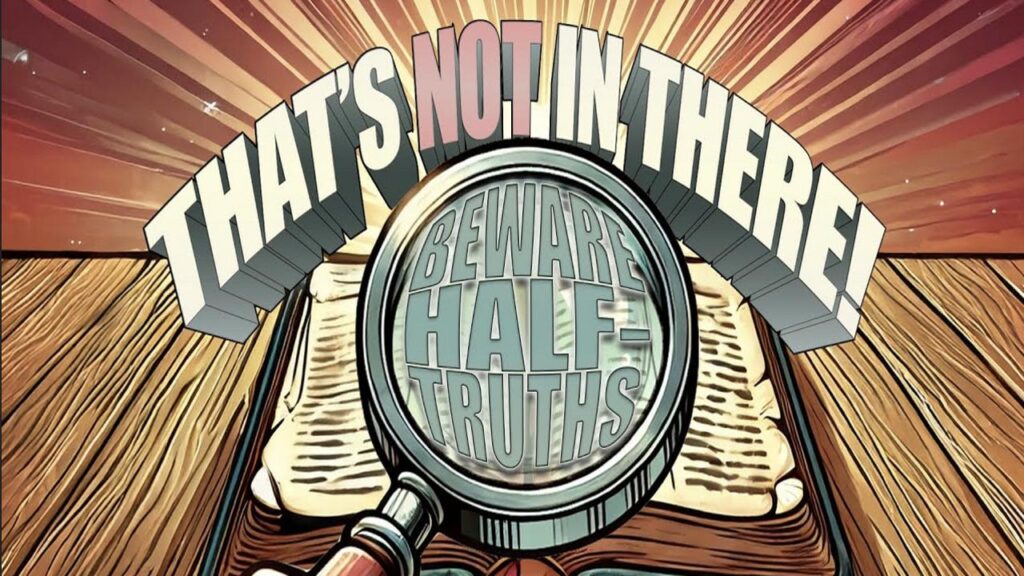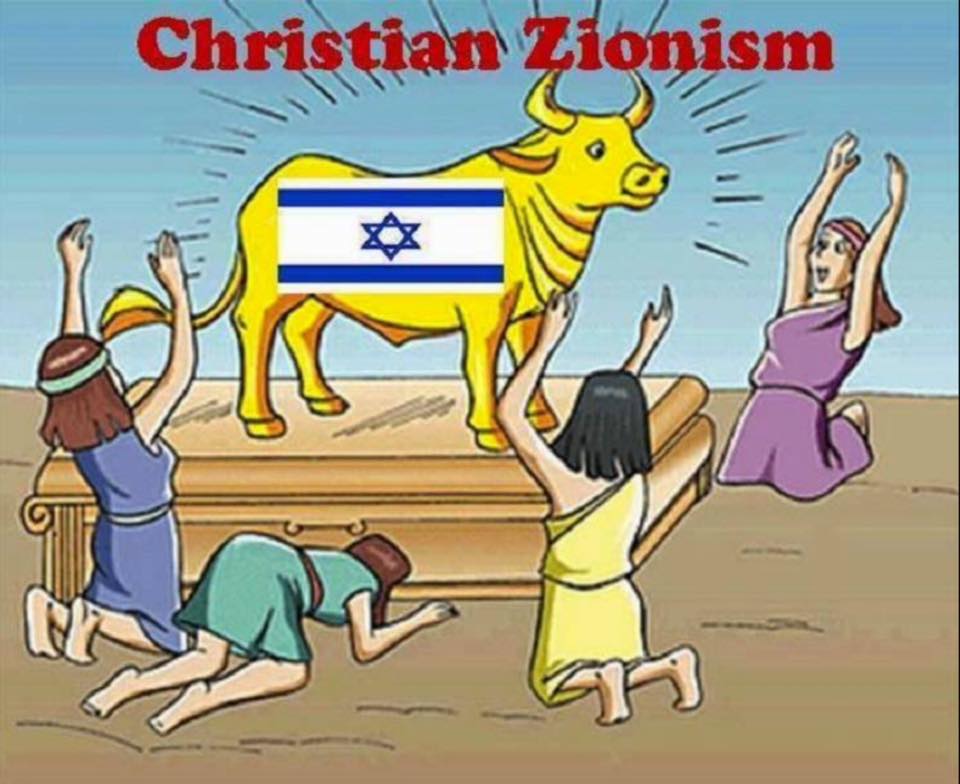Introduction
In today’s geopolitical and religious landscape, confusion has arisen between Judaism, Zionism, and the broader Middle Eastern reality. This confusion has been intensified by political agendas, media narratives, and theological distortions, particularly among Western evangelical circles. By analyzing historical facts alongside biblical scripture, this essay seeks to untangle these threads, clarifying the differences between a faith tradition rooted in divine revelation and a modern nationalist movement born of European politics and Protestant dispensationalism.
Genesis 12:3 (KJV)
“And I will bless them that bless thee, and curse him that curseth thee: and in thee shall all families of the earth be blessed.”
The image at the top claims, “Blessed are those who bless Israel”; however, a thorough examination of the full context reveals that the interpretation presented in the image is inaccurate and misrepresents the original meaning of the verse.

Traditional Misinterpretation:
Today, especially among Christian Zionists and dispensationalists, Genesis 12:3 is misused to teach that modern political Israel (the 1948 state) must be unconditionally supported. The claim is: if you bless Israel (the modern state), God will bless you; if you criticize or oppose Israel, God will curse you.
However, that is not the true biblical meaning.
True Biblical Meaning:
- Context: The Promise Was to Abraham, Not to a Political State Genesis 12:1–3 is God’s personal covenant call to Abram (later Abraham) — an individual.
God is calling Abram out of his homeland to follow Him by faith.
The promise is not made to a modern political entity; it is a covenant with Abraham and his seed — but the New Testament reveals who the true “seed” is. - The True Seed Christ: Paul interprets Genesis 12:3 directly in the New Testament: “Now to Abraham and his seed were the promises made. He saith not, And to seeds, as of many; but as of one, And to thy seed, which is Christ.” — Galatians 3:16, KJV — Thus, the true fulfillment of the Abrahamic promise is found in Christ, not in an ethnic group or political nation.
- Blessing and Cursing Centers on Christ, Not Ethnicity Blessing Abraham and his true Seed (Christ) brings blessing.
Rejecting, opposing, or “cursing” Christ results in judgment. This blessing is not a blank check to support any group that claims Abrahamic descent. It is a spiritual reality: acceptance of Christ leads to salvation (blessing); rejection of Christ leads to condemnation (curse). - “All Families of the Earth Shall Be Blessed” Means the Gospel to the Nations God’s plan from the beginning was universal, not nationalistic. “That the blessing of Abraham might come on the Gentiles through Jesus Christ; that we might receive the promise of the Spirit through faith.” — Galatians 3:14, KJV — The “families of the earth” — Gentiles — would be blessed through faith in Christ, not through political support of an earthly nation.
- Even Abraham’s Physical Descendants Had to Walk by Faith Being born a descendant of Abraham physically did not guarantee blessing. Only those who followed God by faith received the blessing. “Know ye therefore that they which are of faith, the same are the children of Abraham.” — Galatians 3:7, KJV
In Short:
✅ Genesis 12:3 is a prophecy about Christ and the worldwide blessing through the gospel,
✅ It is not a political commandment to support the modern secular state of Israel,
✅ Blessing or cursing is about accepting or rejecting Christ, not about geopolitical alliances.
Now let’s see how this relates to John the Baptist’s warning to the Jews in Matthew 3:9 (KJV) — “And think not to say within yourselves, We have Abraham to our father: for I say unto you, that God is able of these stones to raise up children unto Abraham.”
Key Points:
- Physical Descent from Abraham Was Not Enough — The Jews in John’s day believed they were automatically blessed because they were Abraham’s descendants. John corrects this false security:
Being a blood descendant of Abraham did not guarantee blessing. - God Seeks Spiritual Children, Not Merely Ethnic Ones — John warns that God could raise up spiritual children from stones if necessary. This reinforces the New Testament theme that faith, not fleshly lineage, defines true children of Abraham.
- This Matches Genesis 12:3’s Fulfillment in Christ — The “blessing” to the nations through Abraham was not dependent on maintaining a pure bloodline, but on faith in the promised Seed — Christ. “And if ye be Christ’s, then are ye Abraham’s seed, and heirs according to the promise.”
— Galatians 3:29, KJV - Modern Application: Therefore, just as it was wrong in John’s day to claim Abrahamic blessing based solely on genealogy, it is wrong today to claim special divine favor for the modern political state of Israel based solely on supposed Abrahamic descent. Faith in Christ — not ethnicity, not political nationhood — determines one’s relationship to the promises of God.
Final Summary:
Political Zionism’s claim to divine blessing on ethnic or nationalistic grounds is biblically false.
Genesis 12:3 points to Christ, not modern nationalism.
Matthew 3:9 reinforces that faith, not ethnicity, makes one a true heir of Abraham.
I. Judaism and Zionism: Two Distinct Concepts
Historical Context
Judaism, as a religious tradition, traces its roots to the covenant God made with Abraham (Genesis 12:1–3, KJV) and was centered around the temple worship system established under Moses and David (Exodus 25–27; 2 Samuel 7:12–13). The destruction of the Second Temple in A.D. 70, following the Jewish revolt against Rome (Matthew 24:1–2; Luke 21:6), marked a pivotal shift. Without a temple, Judaism evolved into what became known as rabbinic Judaism, guided by local rabbis and centered on the oral traditions later codified in the Talmud.
For nearly 1,800 years there was no national Jewish state. Jews lived as dispersed communities (the Diaspora) across Europe, North Africa, the Middle East, and beyond, practicing a religion separated from political nationalism. The Talmud itself discouraged mass return to the land of Israel without divine intervention, warning against forced attempts to reestablish Jewish sovereignty (Babylonian Talmud, Ketubot 111a).
Zionism, by contrast, is a 19th-century political movement, not a continuation of biblical Judaism. It emerged primarily from secular European Jews influenced by the rise of nationalism and Protestant eschatology. Protestant fundamentalists in Britain promoted Jewish resettlement in Palestine as part of a misguided end-times theology rooted in dispensationalist interpretations.
Thus, Judaism and Zionism are not synonymous. Judaism is a faith rooted in the Torah and prophets; Zionism is a modern political ideology intertwined with European colonialism.
II. Biblical Prophecy and the End of the Jewish State
The Bible itself foretold the destruction of the Jewish temple and Jerusalem because of Israel’s rejection of the Messiah:
“And when ye shall see Jerusalem compassed with armies, then know that the desolation thereof is nigh.”
— Luke 21:20, KJV
Jesus also warned:
“Behold, your house is left unto you desolate.”
— Matthew 23:38, KJV
The New Testament emphasizes that the old covenant system had reached its conclusion in Christ (Hebrews 8:13). The notion of reviving a national Jewish state as a fulfillment of prophecy stands in opposition to the teachings of the apostles who understood the Church to be the continuation of God’s covenant people — comprising both Jews and Gentiles united in Christ (Galatians 3:26–29).
III. The Creation of Modern Israel: British Imperialism and Protestant Dispensationalism
Modern Israel’s founding resulted from political deals rather than divine restoration. During World War I, Britain issued three conflicting promises:
- The McMahon–Hussein Correspondence (1915) — Promised Arab independence if they revolted against the Ottomans.
- The Sykes–Picot Agreement (1916) — Secretly divided Ottoman lands between Britain and France.
- The Balfour Declaration (1917) — Supported a “national home for the Jewish people” in Palestine.
At the time, Palestine was inhabited by Palestinians — Muslims, Christians, and Jews — living side by side. Zionist immigration fueled tensions, culminating in the Nakba (“catastrophe”) of 1947–1948, when over 700,000 Palestinians were forcibly displaced.
IV. The Misuse of the Term “Anti-Semitism”
The term Semite originally referred to a wide group of Middle Eastern peoples, including Arabs, Hebrews, Assyrians, and Phoenicians. Palestinians, Lebanese, and Syrians are Semitic peoples. However, political Zionism redefined “anti-Semitism” to mean any criticism of Jewish nationalism, effectively shielding Israeli policy from scrutiny.
In Christ, ethnic barriers are irrelevant:
“There is neither Jew nor Greek… for ye are all one in Christ Jesus.”
— Galatians 3:28, KJV
Thus, opposing Zionist policies is not anti-Semitic; it is a legitimate moral and theological stance.
V. Christian Zionism: A Theological Error
Dispensationalism, taught by John Nelson Darby and the Scofield Reference Bible, falsely asserts that God maintains two separate peoples — Israel and the Church. Yet Scripture teaches:
“For he is not a Jew, which is one outwardly… but he is a Jew, which is one inwardly; and circumcision is that of the heart…”
— Romans 2:28–29, KJV
The true “Israel of God” (Galatians 6:16) comprises all who are in Christ. Therefore, Christian Zionism, which grants theological legitimacy to a modern political state, is deeply flawed.
VI. Toward Peace: The Biblical Path
God requires righteousness, justice, and humility:
“He hath shewed thee, O man, what is good; and what doth the Lord require of thee, but to do justly, and to love mercy…”
— Micah 6:8, KJV
Peace in the Middle East demands justice for Palestinians and the recognition of their God-given human dignity, not blind allegiance to political Zionism.
VII. The “Sacred Cow” of Political Zionism in American Policy

Unquestioning U.S. support for modern Israel has become a political sacred cow, reinforced through legislation like the Jerusalem Embassy Act (1995) and endless foreign aid. This political alliance fuels division and violence by uncritically backing one side at the expense of justice.
Paul reminds believers:
“For our conversation is in heaven; from whence also we look for the Saviour, the Lord Jesus Christ.”
— Philippians 3:20, KJV
Earthly allegiances must never replace loyalty to God’s kingdom. The worship of the modern political State of Israel is a form of idolatry that undermines biblical truth and perpetuates injustice.
VIII. The Question of True Israel: Bloodline, Covenant, and Corruption
The idea that the modern State of Israel represents true biblical Israel is historically and theologically mistaken. Scripture reveals that ethnic Israel had already been compromised before Christ’s first advent:
- Edomites (descendants of Esau) forcibly converted under John Hyrcanus (Josephus, Antiquities 13.9.1), heavily influencing Judea’s leadership.
- The priesthood in Ezra and Nehemiah’s time demanded genealogical purity, excluding those who could not prove pure descent (Ezra 2:59–63; Nehemiah 7:61–65).
- Marriages with foreign nations (Ezra 9–10) were condemned to preserve the holy seed.
Thus, by the time of Christ, many “Jews” were not true descendants of Jacob. Christ’s sharp rebukes make sense:
“Ye are of your father the devil…”
— John 8:44, KJV
Jesus and the apostles defined true Israel spiritually, not ethnically. The modern political state — built on human schemes, nationalist ideologies, and intermingled bloodlines — does not represent the covenantal Israel of God.
Timeline of Key Events
| Date | Event | Notes |
|---|---|---|
| 66–70 A.D. | Jewish Revolt against Rome | Second Temple destroyed, diaspora intensified |
| 132–135 A.D. | Bar Kokhba Revolt | Further dispersal of Jews after second failed rebellion |
| ~500 A.D. | Babylonian Talmud Completed | Rabbinic Judaism formalized; mass return discouraged |
| Early 1800s | Protestant Dispensationalism Emerges | Promotes Jewish return for eschatological reasons |
| Late 1800s | Secular Zionism Rises | European nationalism inspires Jewish political movement |
| 1917 | Balfour Declaration | Britain promises Jewish homeland in Palestine |
| 1947–1948 | Nakba | Over 700,000 Palestinians expelled |
| 1948 | State of Israel Declared | Modern Zionist state established |
| 1995 | U.S. Jerusalem Embassy Act | U.S. officially recognizes Jerusalem as Israel’s capital |
| 2024 | U.S. Veto of Palestinian Statehood | Blocks UN recognition of Palestine |
Conclusion
The conflation of Judaism with Zionism has fueled injustice, conflict, and theological confusion. Modern Israel is not the fulfillment of biblical prophecy but a product of 19th-century nationalism and imperial politics. True Israel is defined by faith in Christ, not ethnicity or political statehood.
Believers are called to pursue justice, love mercy, and walk humbly before God — not to idolize earthly powers. Recognizing the truth of history and Scripture is essential to standing faithfully in these deceptive times.
“Blessed are the peacemakers: for they shall be called the children of God.”
— Matthew 5:9, KJV



